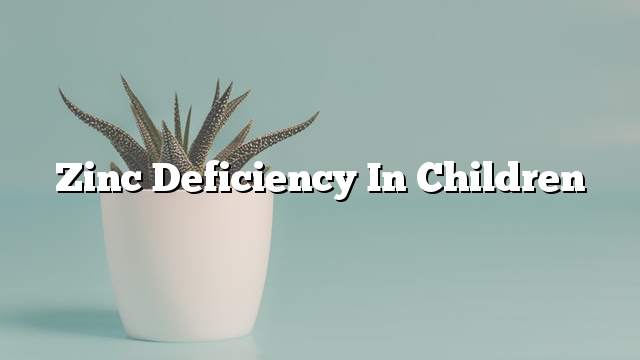Zinc
Zinc plays an important and vital role in the presence of a protein that regulates the production of immune system cells in the human body. Zinc is present in the muscles of the body, retina, kidneys, bones, red and white blood cells, pancreas, prostate gland and sperm.
The body contains more than 300 enzymes that require the presence of zinc to allow the body to carry out its natural activities as required, so attention must be paid to foods containing zinc; zinc deficiency affects both children and adults. Children under 7 years of age need to 5 milligrams per day and less quantity the smaller the child, and children over 7 years need to amount between 10-16 milligrams.
Symptoms of zinc deficiency in children
Zinc deficiency occurs because the body does not take enough daily intake of zinc, or because there is a problem with zinc absorption by the body. There are signs of zinc deficiency in children:
- The occurrence of fatigue and haziness in the body.
- Delayed growth.
- Bone growth in a different way.
- Loss of appetite and weight loss.
- Loss of taste and smell.
- Hair loss.
- The presence of white spots under the nails.
- Diarrhea and depression.
- Skin cracking and dryness and flaking.
- Wound healing and cracks in the corners of the mouth.
- Sleep disorders.
Symptoms of zinc deficiency in adults
- Acne and skin peeling.
- Periodontal infections and recurrent herpes infections.
- Weak immune system.
- Sexual dysfunction and male infertility.
- Weakness of sense of smell and taste and lack of secretions of the stomach, resulting in poor digestion.
- The onset of gray hair at an early age.
- Weakness of sight and retinopathy.
- Menstrual disorders and infertility in females.
- Numerous neurological problems such as stress and anxiety.
The most vulnerable groups are zinc deficiency
- Lactating women and pregnant women.
- Children between the ages of seven months to a year; in case the mother depends on the food of her baby to breastfeed only, because the mother’s milk during that period decreased amounts of zinc, so it is recommended to give the child natural food starting at the age of seven months in addition to breastfeeding.
- People who complain of chronic diseases such as: cancer, gastrointestinal diseases, kidney disease, liver.
- Vegetarians, because the body absorbs zinc from animal sources such as meat at a higher rate than plant sources such as legumes, grains, and seeds because plant sources contain fitate, which combines with zinc and reduces absorption of the body.
